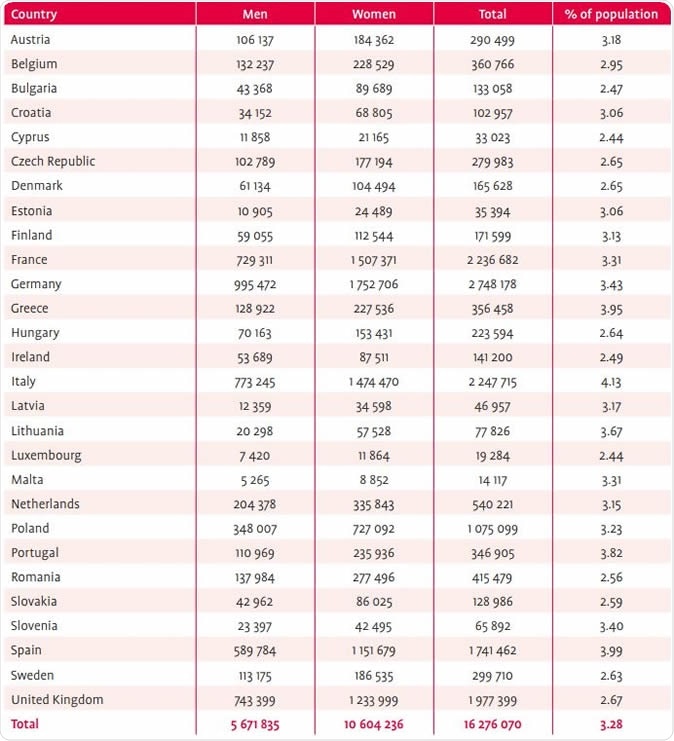Alzheimer Europe presented a new study at a European Parliament lunch debate in February 2020, which projects a doubling of the number of cases with Alzheimer’s disease (AD) by 2050.
This is the most recent analysis of existing literature on dementia to come up over the last three decades. The last of the European studies was ALCOVE, the first EU Joint Action on Dementia from 2011 to 2013. It followed the EURODEM study conducted in the first part of the 1980s and updated in 2000, and the European Collaboration on Dementia by Alzheimer Europe, called EuroCoDe, from 2006 to 2008.

The report demonstrates a clear and urgent need for further research into the prevalence of dementia in people aged under 65, and more specifically, the need for community-based studies to be inclusive of this age group. Image Credit: Atthapon Raksthaput / Shutterstock
Alzheimer’s disease
Alzheimer’s disease is a progressive condition marked by the ongoing loss of memory, thinking, judgment, decision making, and ultimately independent thought and action. There are as many as 5.5 million Americans with dementia, and the overwhelming majority are over the age of 65 years, making it predominantly a disease of old age. Europe had 10.5 million people with AD in 2015, and the numbers are predicted to rise.
However, with the current population trends, it is easy to see that the number of people with AD will only go up over time because of the graying of Western countries, and the fact that advancing age is the most critical risk factor for this condition.
On the other hand, about 200,000 people with AD in the US are younger than 65 years; a condition called early-onset AD.
The current study is a collaborative analysis of multiple studies on the prevalence of dementia that have come out after the EuroCoDe project came to an end. It includes 16 studies that met the criteria defined by the investigators.
The findings
The most important conclusions of the current report include:
- Reduced prevalence of dementia in men of all ages over the last decade, as compared to Alzheimer Europe’s estimates after the EuroCoDe study
- A reduction in prevalence for women of nearly all age groups except 75 to 79 years, as compared to the estimates of the EuroCoDe study
- Over 7.8 million people in the European Union have dementia and 9.7 million in the other European countries that are part of the AE. These estimates are significantly less than the 8.7 million and the 10.9 million that was projected for the EU and the AE, respectively.
- There are still more than twice as many women as there are men with dementia in Europe, at over 6.6 million and 3.1 million respectively
- The number of people living with dementia in Europe will go up to almost twice the current amount by 2050, with 14.2 million and 18.8 million in the EU and AE regions, respectively.

The prevalence of dementia in Europe (EU-28) – 2050
The organization also emphasized the limitations that are significantly affecting the quality and amount of research into this debilitating condition, such as:
- Not much research into how many younger people have dementia
- Lack of understanding of the different types of dementia and their prevalence
- No research into the number of people at each of the stages of dementia, including mild impairment of cognition
- Not much is known about how many people from each ethnic group have dementia
The implications
Commenting on these results, Jean Georges, who is the Executive Director of Alzheimer Europe, says that the change to a more healthy lifestyle, improved education and a reduced risk of cardiovascular disease due to the increased control of risk factors appears to have successfully brought down the risk of AD. Yet, she points out, “Our report also demonstrates that the number of people living with the condition is set to increase substantially in the years ahead, which will only place greater pressure on care and support services unless better ways of treating and preventing dementia are identified.”
As the Director predicts, it is the obligation of governments to upgrade their health and care facilities to ensure that both patients and their caregivers can get the personal high-quality care they need. This will involve putting more money and effort into finding out what treatments are effective and how this condition can be prevented. This will include clinical trials for various interventions, such as dietary modification, pharmacotherapy, and lifestyle modification. Also, caregivers need to have a voice in framing plans for the care of such patients to ensure that they have access to the necessary support while carrying a heavy and prolonged burden of intensive care.